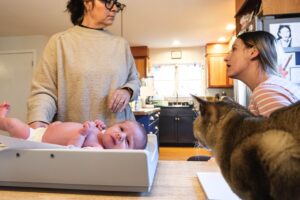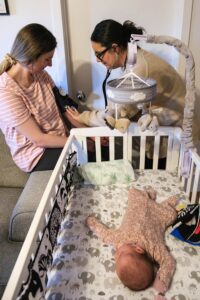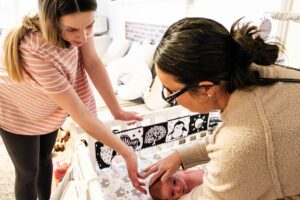TRURO — On a Thursday morning in early December, Rana O’Laughlin arrives at Jelena Duarte’s house, greeted by Pickle the cat and Duarte’s 18-month-old daughter, Vera. The atmosphere is subdued, as if dictated by the gentle breaths of the newest family member, baby Mila, born on Nov. 25 at Cape Cod Hospital, who sleeps in her crib in the living room.

O’Laughlin, a nurse with the Visiting Nurse Association’s Perinatal Pathways program, assesses Duarte’s postpartum recovery, taking her pulse and blood pressure and checking her C-section incision. In the kitchen, Duarte’s husband, Vincent, keeps Vera entertained.
“It’s harder this postpartum,” says Duarte, reflecting on the hormonal upheaval and challenges of adjusting to two young children with competing needs. O’Laughlin’s visits, which last about 45 minutes, have been at least as helpful to Duarte this time, she says, as they were when Vera was born last year.
For new parents on the Outer Cape, the postpartum period can feel isolating, but a network of care, though fragmented, offers critical support.
The fundamentals of postpartum care are offered by the Visiting Nurse Association of Cape Cod for parents who give birth at Cape Cod Hospital. They are eligible for a VNA program that provides postpartum health checks, lactation support, and home visitsincluding with interpreters if needed and covered by insurance.
O’Laughlin says she also screens parents for perinatal mood and anxiety disorders, which affect one in five people during pregnancy or after giving birth, according to a January 2024 report in Health Equity, but are often underdiagnosed. She says that it can be hard for people to admit they are struggling and ask for help.
When she asks people if they’ve ever had postpartum mood changes, they aren’t sure. “I think so,” is a frequent answer, she says, and so is, “I never told my provider.” But O’Laughlin can help parents discuss these problems as well as remedies like medication, therapy, or home visits geared to improve sleep and nutrition.
Parents who are patients at Outer Cape Health Services can get two in-home postpartum check-ins one at two weeks and another at six weeks after delivery. These assess both parent and child health and provide lactation support.
What Doulas Do
Erinn Bray, a birth and postpartum doula from Yarmouth, says what she does with new parents is different, often involving simple yet vital tasks like holding a baby so a parent can shower, cooking a hot meal, or offering emotional reassurance — the kind of support that was once woven into the fabric of small communities.

“Your neighbors would stop by to help,” says Bray. “But now families have moved apart. We don’t always know our neighbors. That support structure might not be there.”
Becky Fischer, a postpartum doula and certified lactation consultant from Brewster, adds, “It’s really important for parents to get a little bit of a break so they can fill their own cups.”
Studies show that doula care during pregnancy and the postpartum period can improve well-being for both parents and infants.
Even doulas need doulas, says Jenna Howe. A doula herself, she sought out Bray before she had her daughter, Ivy, at home in Truro in October 2023.
Howe and her husband, Dave, planned ahead to pay for Bray’s services directly. Howe says Bray’s support, which she had for several nights a week over five months, was invaluable, especially because she does not have family nearby, only a collection of chosen aunties. “It was amazing to have someone come and help me and not feel like I had to do everything alone,” she says.
Bray and Fischer have both worked with Monumental Beginnings Doula Services, a coalition of doulas providing nonmedical pregnancy, birth, and postpartum support to families throughout Massachusetts.
Over the last two years, with $80,000 in grants secured with the Cape Cod Children’s Place in Eastham and the Cape & Islands Maternal Depression Task Force, doulas from Monumental Beginnings were able to offer nine hours of free in-home visits to families across the Cape and Martha’s Vineyard. But the grants ran out in September.
According to Cindy Horgan, executive director of the Children’s Place, 276 Cape and Islands families with infants benefited from the program.
Fischer doesn’t work with private-pay clients, so the expiration of the grants put her in-home doula work on pause. “I don’t think it’s a service a lot of parents can afford or prioritize to spend money on,” she says.
Greater access may be on the horizon. Gov. Maura Healey signed the Maternal Health Bill in August, requiring MassHealth, the state’s Medicaid program, to cover doula services for up to 12 months postpartum, including for pregnancy loss and abortion. This builds on a December 2023 initiative allowing doulas to enroll as MassHealth providers with reimbursement rates of up to $1,700 per client.
About 150 doulas statewide have enrolled since last year, according to an Oct. 29 GBH story. That may not sound like a lot, but it’s three times as many as MassHealth officials expected.
Filling the Gaps
The Cape Cod & Islands Health Imperatives Healthy Families program operates out of a Hyannis clinic but sends home visitors into households throughout the Cape and Islands. The program supports pregnant and parenting young adults under 26. Participants can be referred by a doctor but also through social services, schools, or even friends who are in it.

Weekly group meetings for the first six months of the child’s life, then monthly meetings and one-on-one mentorship until the child is three help guide new parents in recognizing developmental milestones and getting needed social services.
Kelly Crosby Hicks, director of maternal and child health services at Health Imperatives, says the home visitors “are nonjudgmental and show up when they say they are going to show up — that’s often missing in our participants’ lives.” Over the course of the program, Crosby Hicks says, the home visitors “become people our participants can really trust.”
Informal community groups give parents on the Outer Cape other ways to connect. There’s a drop-in weekly infant feeding support group on Tuesdays at 10 a.m. at the Eastham Public Library with lactation consultant and birth educator Liz Cable.
Fischer leads the New Moms Group at the Children’s place — a weekly meeting held at 10 a.m. on Thursdays for moms to meet and share advice. The Children’s Place offers an array of ways to connect, from playgroups to groups for dads to one for parents recovering from opioid use.
What just about every new parent needs, says Fisher, is to “just be together and talk.”



